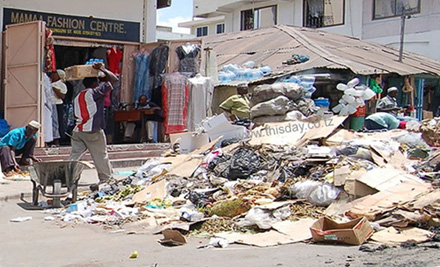
Photo by Tanzania's ThisDay.
No! No! Let me come to the needed rescue of Dar: It is NOT the world’s 8th dirtiest city; it is, in fact, the world’s 12th dirtiest city!
Mercer Health & Sanitation’s Index rated Dar at 40.4. Only three other cities in Africa were rated worse than Dar: Ndjemna (Chad) at #11, Brazzaville (Congo) at #10, and Addis Ababa (Ethiopia) at #6.
No other East African cities came in the top 25, although Nairobi fell into the top 35.
(Multiple African news reports cited a “NYC Consulting Firm” rating of #8 for Dar, but there doesn’t seem to exist an “NYC Consulting Firm.” That list of the world’s dirtiest cities is close to the real Mercer ratings, but not exact.)
Dar is not denying the criticism.
“It is true and I accept that the city of Dar es Salaam is dirty,” Dar es Salaam Regional Commissioner William Lukuvi told This Day an on-line Tanzanian news source. And that’s good, of course.
Dar is the fastest growing city in East Africa. No one is sure about its size, and it’s probably not as big as Nairobi, but closing the gap quickly. It also lacks Nairobi’s sprawling slums, which in an unusual way contributes to the lower Mercer rating.
Nairobi slums have been around for a long time and many NGOs have worked at them, as has the central government. Sewage, bad water, and the diseases that spread as a result, are the main reasons for Mercer’s list of the worst cities. And ironically, the decade and longer attention to the Nairobi slums has actually mitigated what would otherwise be an uncontrollable catastrophe.
Don’t get me wrong. The Nairobi slums are terrible, but the makeshift gullies cut by NGOs and the government does drain human sewage, the main cause of cholera. Last year there was more cholera in Dar than Nairobi.
Dar’s problem is that it is far behind Nairobi in sewage treatment and waste disposal. This is probably because Dar is on the ocean, and it has been common practice to just dump waste into the sea. The practice is now haunting the city, because unlike Nairobi, it has no well-organized sewage disposal.
Dar’s other problem is corruption. Dar’s three municipalities each contract private companies for garbage disposal, but don’t pay them. Instead, they allow the private companies to collect levies however they wish, a completely haphazard and terribly corrupt system.
To his credit, Lukuvi knows this.
“The present system is messed up. You can’t have a contracted company collect garbage and levies at the same time. The municipalities will henceforth be responsible for collecting the levies and paying the companies that are contracted to collect the garbage,” Lukuvi told This Day.
The annual Mercer ratings are important. They corroborate the United Nation’s warning that the greatest threat to the developed world is the lack of clean water.
Of Mercer’s 25 worst cities, 20 are because of a lack of clean water. Only 5 are because of air pollution.